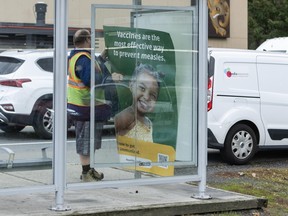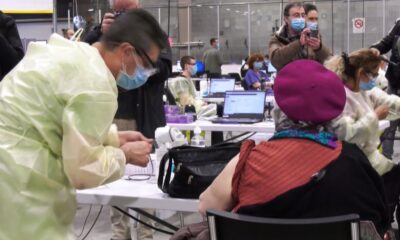Health
Study Reveals mRNA Vaccines Boost Survival for Cancer Patients

A recent retrospective study from the University of Texas MD Anderson Cancer Center and the University of Florida has found that mRNA coronavirus vaccines can significantly enhance the survival of cancer patients undergoing immunotherapy. The research indicates that patients with advanced non-small-cell lung cancer and melanoma who received these vaccines experienced nearly double the median survival time compared to those who did not.
The study analyzed the medical records of over 1,000 patients treated at MD Anderson, focusing on those who had commenced approved immunotherapy for their conditions. The findings revealed that patients vaccinated against COVID-19 within 100 days of beginning their cancer treatment had a median survival time of 37.3 months, compared to just 20.6 months for unvaccinated patients.
Adam Grippin, the lead author of the study, expressed enthusiasm about the implications of these results, stating, “This data is incredibly exciting, but it needs to be confirmed in a Phase III clinical trial.” Grippin, who is now a radiation oncologist at MD Anderson, indicated that plans for such a trial are already underway, with hopes to start patient enrollment by the end of the year.
Potential Implications for Cancer Treatment
The findings could pave the way for developing a universal cancer vaccine, which would be a significant advancement in oncology. This comes at a challenging time for mRNA vaccine research, as Robert F. Kennedy Jr., the U.S. Secretary of Health and Human Services, announced plans to cease nearly $500 million in funding for mRNA vaccine development, citing ineffective protection against upper respiratory infections. This decision has faced criticism from many scientists who contest the validity of the claims regarding the vaccines’ effectiveness.
In the study, 900 patients with advanced lung cancer were monitored, and those who received COVID-19 vaccines showed improved survival rates. The immunotherapy used, known as immune checkpoint treatment, works by enhancing the immune system’s ability to attack cancer cells.
When asked for a statement regarding the study’s findings, the Department of Health and Human Services acknowledged the potential benefits of vaccination, particularly for individuals under 65 who are at increased risk of severe COVID-19, including advanced cancer patients.
Understanding the Mechanism
The precise mechanism by which mRNA vaccines enhance the immune response against cancer remains unclear. Elias Sayour, a pediatric oncologist at the University of Florida Health and co-author of the study, noted that RNA’s evolutionary role may play a part. He explained, “RNA preceded DNA evolutionarily, so cells don’t like RNA from the outside world coming in. So when that happens, that sets off all the alarms of the human body.”
Alongside the patient records analysis, researchers conducted laboratory experiments using mouse models, which indicated that the combination of immunotherapy and mRNA vaccination effectively slowed tumor growth.
Katalin Kariko, a prominent researcher in the field and co-winner of the 2023 Nobel Prize in Medicine, remarked on the promising nature of these findings, stating that many scientists have observed similar effects of COVID-19 vaccines on cancer growth.
There are currently around 150 clinical trials for mRNA vaccines underway globally, with nearly half focused on infectious diseases and many targeting various cancers. Experts believe that the adaptability and rapid development capabilities of mRNA technology may lead to significant advancements in cancer treatment.
The study was funded by the National Cancer Institute and several foundations, highlighting the collaborative efforts in exploring the intersection of vaccine technology and cancer therapy. As research continues, scientists hope that this new direction may lead to improved treatment options for cancer patients, who often face grim prognosis despite existing therapies.
Grippin emphasized the potential of mRNA vaccines, stating, “Few things have been tested as comprehensively as the COVID-19 mRNA vaccine. I’m not saying this is the cure for cancer, but it is a tool that can allow us to markedly improve the response to immunotherapy.”
As this research unfolds, the hope is that it will not only enhance our understanding of cancer treatment but also prompt a reevaluation of mRNA vaccine development in the broader medical landscape.
-

 World3 months ago
World3 months agoScientists Unearth Ancient Antarctic Ice to Unlock Climate Secrets
-

 Entertainment3 months ago
Entertainment3 months agoTrump and McCormick to Announce $70 Billion Energy Investments
-

 Lifestyle3 months ago
Lifestyle3 months agoTransLink Launches Food Truck Program to Boost Revenue in Vancouver
-

 Science3 months ago
Science3 months agoFour Astronauts Return to Earth After International Space Station Mission
-

 Technology2 months ago
Technology2 months agoApple Notes Enhances Functionality with Markdown Support in macOS 26
-

 Top Stories2 weeks ago
Top Stories2 weeks agoUrgent Update: Fatal Crash on Highway 99 Claims Life of Pitt Meadows Man
-

 Sports3 months ago
Sports3 months agoSearch Underway for Missing Hunter Amid Hokkaido Bear Emergency
-

 Politics3 months ago
Politics3 months agoUkrainian Tennis Star Elina Svitolina Faces Death Threats Online
-

 Technology3 months ago
Technology3 months agoFrosthaven Launches Early Access on July 31, 2025
-

 Politics3 months ago
Politics3 months agoCarney Engages First Nations Leaders at Development Law Summit
-

 Entertainment3 months ago
Entertainment3 months agoCalgary Theatre Troupe Revives Magic at Winnipeg Fringe Festival
-

 Politics2 weeks ago
Politics2 weeks agoShutdown Reflects Democratic Struggles Amid Economic Concerns





















